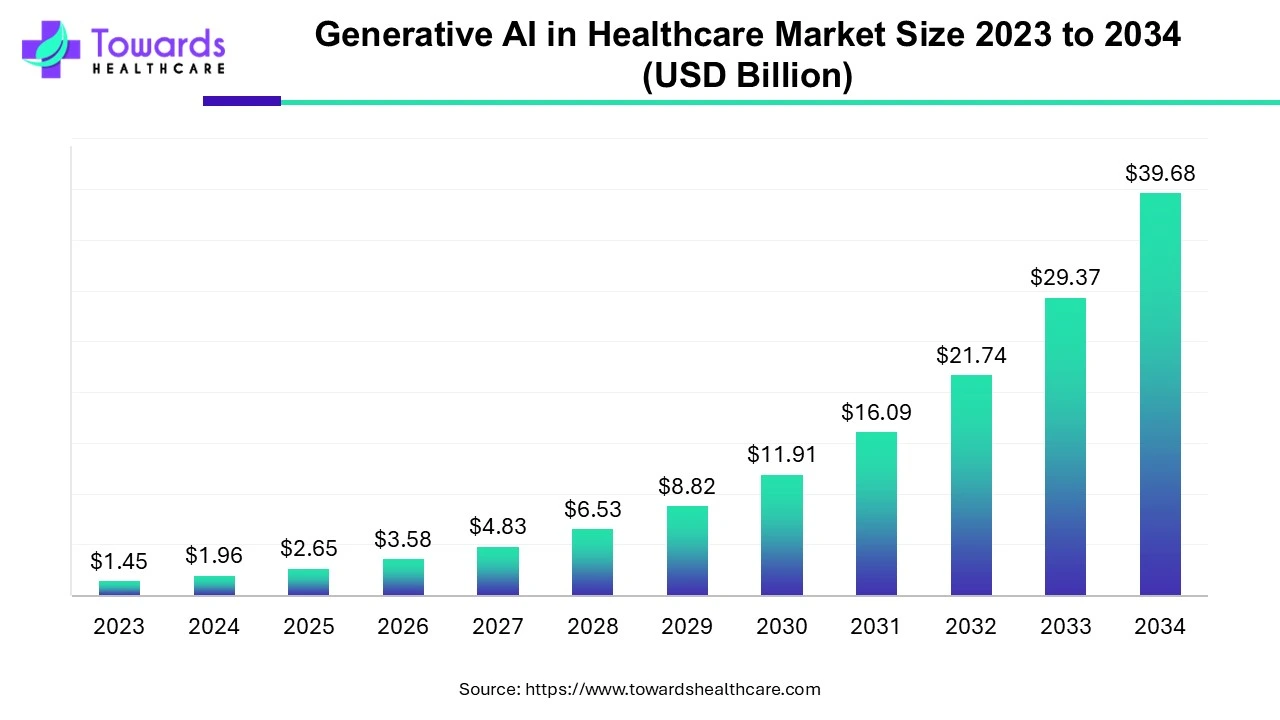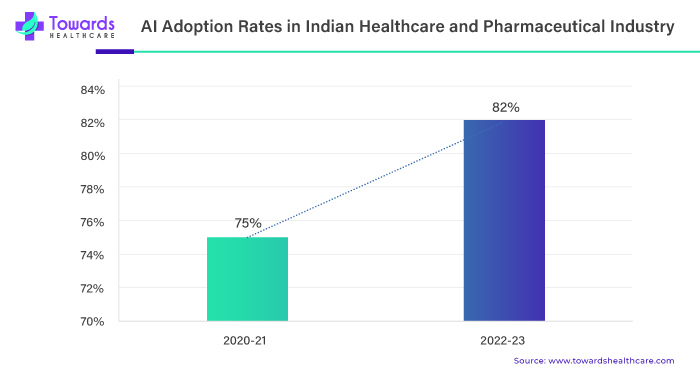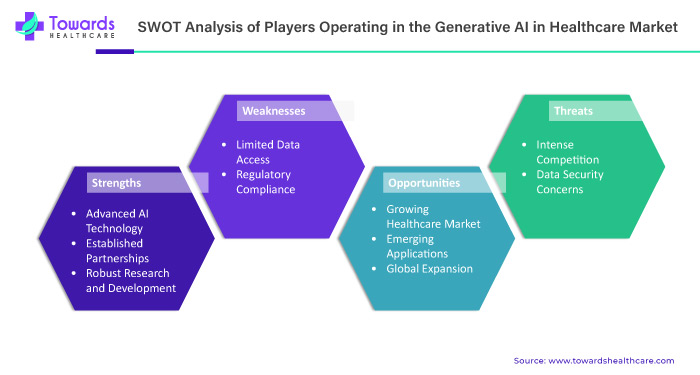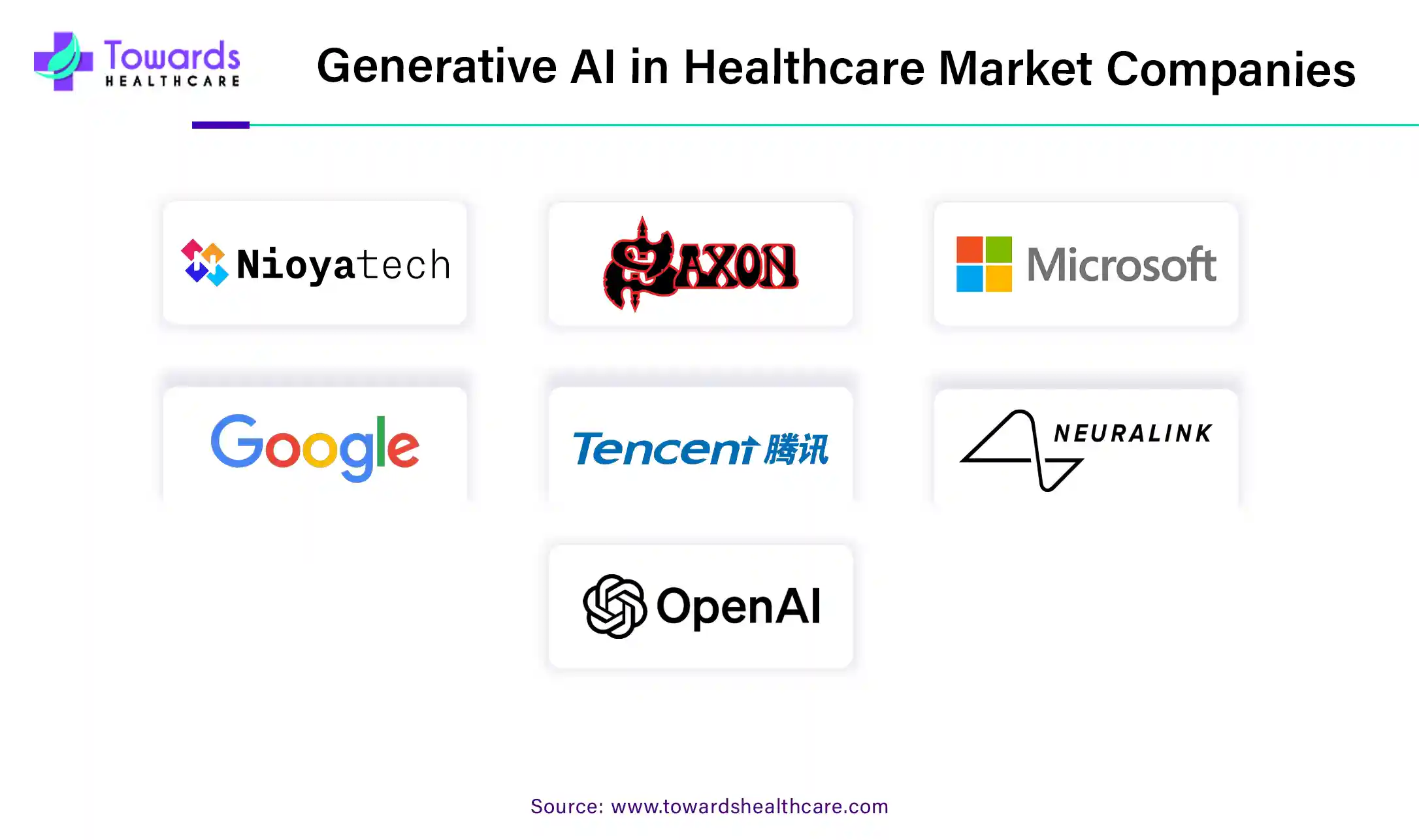January 2026

The generative AI in healthcare market size is anticipated to grow from USD 2.65 billion in 2025 to USD 53.68 billion by 2035, with a compound annual growth rate (CAGR) of 35.10% during the forecast period from 2025 to 2034, because of the potential for accelerating medical research and drug discovery.

Over 30% of New Drugs are Predicted to be Discovered by Generative AI by 2025.
The market for generative AI in healthcare is experiencing rapid growth as the healthcare industry seeks innovative solutions to improve patient outcomes, streamline processes, and optimize resource allocation. Generative AI, a subset of artificial intelligence, involves the use of algorithms and models to generate new and original content, such as images, text, and even entire patient profiles.
The market is driven by several factors, including the increasing adoption of AI in healthcare, the growing availability of large healthcare datasets, and the need for more efficient and accurate decision-making tools. Generative AI has the potential to revolutionize healthcare by enabling the creation of synthetic data for training models, generating personalized treatment plans, and assisting in medical research and drug discovery.
| Metric | Details |
| Market Size in 2025 | USD 2.65 Billion |
| Projected Market Size in 2035 | USD 53.68 Billion |
| CAGR (2026 - 2035) | 35.10% |
| Leading Region | North America |
| Market Segmentation | By Component, By Function, By Application, By End-Use and By Region |
| Top Key Players | Syntegra, NioyaTech, Saxon, IBM Watson, Microsoft Corporation, Google LLC, Tencent Holdings Ltd. |
The generative AI in healthcare market is experiencing a significant boost due to a massive increase in the launch of new products and services. This surge in offerings is being driven by the growing demand for innovative AI solutions in the healthcare industry. As the potential benefits of generative AI become more apparent, healthcare organizations, pharmaceutical companies, technology providers, and startups are actively developing and introducing new AI-driven products and services to cater to various healthcare needs.
Thus, the massive increase in the launch of products and services is a clear indication of the growing significance and potential of generative AI in healthcare. As the market continues to evolve and mature, these new offerings will play a pivotal role in transforming the healthcare industry, enhancing patient care, and driving greater efficiency and accuracy in medical decision-making.
The generative AI in the healthcare market is experiencing rapid growth, primarily fueled by increasing investments and strategic partnerships within the industry. Healthcare organizations and technology companies are recognizing the immense potential of generative AI in transforming various aspects of healthcare delivery, patient care, and medical research. Investments in research and development of generative AI technologies are leading to the creation of innovative solutions that can analyze complex medical data, generate personalized treatment plans, and assist healthcare professionals in making more accurate diagnoses. These advancements are revolutionizing patient care and contributing to improved health outcomes.
In addition, strategic partnerships between healthcare institutions and AI technology providers are facilitating the integration and adoption of generative AI solutions into existing healthcare systems. Collaborations with AI experts allow healthcare organizations to leverage cutting-edge technologies, data analytics, and machine learning algorithms to address critical challenges in the industry, such as patient engagement, disease prediction, drug discovery, and medical image analysis.
Thus, the increasing investments and partnerships in generative AI in the healthcare market are fostering a conducive ecosystem for the advancement and widespread implementation of AI technologies in the healthcare industry. This trend is expected to continue driving significant growth and innovation in the healthcare AI market, ultimately benefiting patients, healthcare providers, and other stakeholders in the healthcare ecosystem.
The demand for precise and personalized treatment plans is a significant factor driving the growth of generative AI in the healthcare market. Conventional treatment methods typically rely on a generic approach that may not account for individual patient characteristics and specific requirements. By leveraging generative AI, which analyzes extensive datasets encompassing patient records, genetic data, and medical imaging, the potential exists to overcome this limitation and generate tailored treatment plans.
In January 2023, AllianceChicago, a network of over 70 community health centers in 19 states, revealed the positive impact of AI-enabled chatbots on patient engagement. Their study found that the use of these chatbots resulted in a significant increase of 13% in well-child visits and immunizations when compared to a control group. Moreover, visits and immunizations experienced a remarkable overall boost of 27% within the targeted group. This data highlights the potential of chatbots in enhancing patient engagement and encouraging individuals to seek essential healthcare services, ultimately leading to better and more personalized treatment plans for patients.
In addition, generative AI algorithms can analyze vast amounts of data, identify patterns, and generate predictions and recommendations based on individual patient profiles. This enables healthcare providers to make more informed decisions regarding treatment options, dosage adjustments, and potential side effects. By incorporating patient-specific factors, such as genetics, lifestyle, and medical history, generative AI algorithms can optimize treatment outcomes and enhance patient care.
The acceleration of medical research and drug discovery is another significant driving force in the generative AI healthcare market. Traditional methods for developing new medications and therapies are notorious for being time-consuming, expensive, and prone to high failure rates during clinical trials. However, generative AI presents an exciting opportunity to tackle these challenges by facilitating the generation of innovative molecules, predicting their properties, and aiding in the identification of potential drug targets.
In June 2023, in a groundbreaking experiment featured in JAMA, physician-researchers from Beth Israel Deaconess Medical Center (BIDMC) assessed the diagnostic capabilities of Chat-GPT 4, a widely known publicly available chatbot powered by generative AI. The results were remarkable, with Chat-GPT 4 accurately identifying the correct diagnosis as its top choice in nearly 40% of the challenging medical cases. Furthermore, in two-thirds of these complex cases, the chatbot successfully included the correct diagnosis in its list of potential diagnoses. This experiment signifies a significant step forward in the application of AI-driven chatbots in the medical field, demonstrating their potential to aid in diagnosing challenging medical conditions and providing valuable insights to healthcare professionals.
Generative AI algorithms can analyze vast databases of chemical compounds, biological data, and clinical trial results to generate new molecules with desired properties. These molecules can be further optimized and tested using computational models, reducing the time and cost involved in traditional drug discovery processes. Additionally, generative AI can aid in virtual screening and lead optimization, identifying potential drug candidates with higher success probabilities.
By accelerating the drug discovery process, generative AI can contribute to the development of innovative therapies and treatments for various diseases, including rare and complex conditions. It can help pharmaceutical companies optimize their research and development pipelines, reduce costs, and increase the chances of successful clinical outcomes.
Ethical and regulatory considerations present a significant constraint in the generative AI healthcare market, primarily concerning the use of AI algorithms in patient care. The opacity, interpretability, and possible biases of generative AI algorithms, which generate new content and make predictions based on intricate patterns, raise concerns about their transparency and fairness. Healthcare organizations and regulatory bodies face challenges in ensuring the reliability, safety, and ethical use of generative AI algorithms. The interpretability of AI-generated recommendations is crucial for healthcare professionals to understand the underlying reasons and make informed decisions. The lack of interpretability and transparency in generative AI algorithms can hinder their acceptance and adoption in healthcare settings.
Additionally, there are concerns about data privacy and security when using generative AI algorithms in healthcare. The algorithms require access to large and diverse datasets, including sensitive patient information. Ensuring data protection, informed consent, and compliance with privacy regulations are essential aspects that need to be addressed to maintain patient trust and safeguard confidential information.
Furthermore, the potential biases inherent in training datasets can be reflected in the generative AI algorithms, leading to biased recommendations or decisions. Biases related to gender, race, and socioeconomic factors can impact the accuracy and fairness of the generated content. Addressing these biases and ensuring algorithmic fairness is a critical challenge in the widespread adoption of generative AI in healthcare.
By component, the solution segment held a dominant presence in the market in 2024. Numerous health-tech companies develop software solutions integrating generative AI for healthcare use. Solutions are widely preferred by healthcare companies as they provide complete access to their data. Integrating genAI can increase the creativity, quality, and productivity of software. Companies can maintain the privacy of their data by incorporating software into their healthcare system. It offers numerous benefits, including cost-effectiveness and efficacy. Favorable regulatory compliance also potentiates the segment’s growth.
By component, the services segment is predicted to witness significant growth in the market over the forecast period. Generative AI services enable companies to drive breakthrough innovation and help them stay competitive in the market. Services offer advanced data analytics, fraud detection, and personalized solutions. GenAI services also enable companies to focus on business outcomes and increase their sales.
By function, the medical imaging analysis segment led the global market in 2024. The rising prevalence of chronic disorders and advancements in diagnostics favor the segment’s growth. GenAI revolutionizes the way imaging data is analyzed by radiologists or other healthcare professionals. It reduces manual errors and increases evaluation time. It significantly improves diagnostic accuracy and provides more detailed insights into patient anatomy. It can also find hidden defects in medical imaging. GenAI enables healthcare professionals to provide personalized medicine based on their results.
By function, the robot-assisted AI surgery segment is projected to expand rapidly in the market in the coming years. The most common application of genAI in the healthcare sector is the development and use of robotics for surgeries. The increasing number of surgeries and the rising adoption of advanced technologies, especially in developing countries, promote the segment’s growth. It is estimated that more than 310 million surgeries are performed every year globally. AI-enabled robots simplify a surgeon’s task and reduce potential errors. They can perform complex procedures with enhanced precision, flexibility, and control.
By application, the clinical segment held the largest share of the market in 2024. The rising geriatric population and the increasing incidences of chronic disorders fuel the segment’s growth. Generative AI can transform every aspect of the clinical field, from disease screening and prevention to treatment. It can also be used to develop novel drugs using AI-assisted drug discovery systems. It can aid in early identification of disease and predict therapeutic outcomes. GenAI can also suggest personalized treatment to patients based on their diagnostic results.
By end-use, the clinical research segment held the major share of the market in 2024. The growing research and development activities and the increasing number of clinical trials contribute to the segment’s growth. GenAI can streamline the entire research and clinical trial process, reducing the burden on healthcare professionals. It can automate routine tasks like data cleaning and statistical programming, enhancing clinical decision-making. It can also help in the recruitment process of patients for large-scale clinical trials.
By end-use, the medical centers segment is estimated to show lucrative growth in the market over the studied years. Medical centers integrate generative AI solutions to automate routine processes and aid in diagnosis support and treatment planning. By leveraging genAI, medical centers can strengthen their market position, attracting more patients. GenAI can also aid in data entry, appointment scheduling, and some aspects of patient care, like monitoring vital signs of disease.
North America currently holds the largest market share in the generative AI in healthcare market. The region is characterized by a technologically advanced healthcare system, substantial investments in AI research and development, and the presence of major market players. The United States is a prominent country in North America, exhibiting a major market share due to its robust AI infrastructure, extensive healthcare data repositories, and supportive regulatory environment.
One of the most sophisticated healthcare systems in the world is found in North America, especially in the U.S. and Canada. This comprises state-of-the-art medical facilities, research centers, and a strong network of clinics and hospitals implementing generative AI technology to improve resource management, expedite operations, and improve patient care. The incorporation of AI tools and technology into routine medical practice is supported by a robust healthcare infrastructure. Additionally, the area is leading the way in healthcare's digital transformation and technology preparedness. A perfect setting for incorporating generative AI into healthcare processes is created by the quick uptake of telemedicine, electronic health records (EHR), and health IT infrastructure.
For instance,

United States Generative AI in Healthcare Market Trends
The demand for genAI in the U.S. healthcare sector is increasing, driven by a robust healthcare infrastructure and favorable government support. The U.S. states, such as California, Colorado, Illinois, New York, and Utah, have regulated the use of genAI in healthcare organizations. The California government recently signed a bill regarding AI that can generate derived synthetic content, including images, videos, audio, and other digital content, in healthcare facilities.
Canada Generative AI in Healthcare Market Trends
The increased workload on Ontario healthcare professionals (94%) potentiates the need for adopting genAI in healthcare facilities. According to a recent survey, approximately 20% of respondents use generative AI (genAI) daily. Vancouver General Hospital’s oncology department reported a 25% increase in treatment effectiveness through personalized protocols generated by AI.
Because of the region's large and diversified population, precision medicine is becoming more and more important in this dynamic environment, which in turn is driving a demand for specialized healthcare solutions. Additionally, the Asia Pacific area gains from having top-notch research institutes and solid industry-academia partnerships, which speed up the creation and implementation of generative AI applications that have the potential to completely transform healthcare results.
However, the Asia Pacific region is projected to grow at the fastest rate in the upcoming years. The region is witnessing rapid advancements in healthcare technology, increasing healthcare expenditure, and a growing focus on AI-driven solutions. Countries such as China, India, and Japan are investing heavily in AI research and implementation, leading to significant growth opportunities in the generative AI in the healthcare market.
China Generative AI in Healthcare Market Trends
The Chinese government has enacted and released several laws and regulatory documents to regulate genAI in the healthcare sector. Researchers from Cerner Enviza, Shanghai, and Oracle Life Sciences, Singapore, conducted a survey, evaluating the transformative role of genAI in revolutionizing patient access to healthcare across China. Approximately 42% had utilized genAI to access medical information and services, and 48% reported satisfaction with Chatbot services.
India Generative AI in Healthcare Market Trends
The Indian government launched several initiatives, like the IndiaAI Mission and the Centres of Excellence for AI, to expand access to computing power, supporting research and helping startups create solutions. The collaboration between ICMR and IndiaAI with countries like the UK and Singapore is responsible for innovation and global best practices.
Europe is estimated to grow significantly in the market during the forecast period. Because hospitals and clinics that handle patient health records, administrative workflows, diagnostics, and surgeries are increasingly integrating AI, the European market has a sizable share. Furthermore, it is anticipated that the existence of significant biotech and pharmaceutical organizations utilizing AI for creative drug development procedures would accelerate the expansion of the regional industry.
Germany Generative AI in Healthcare Market Trends
Germany is leading in healthcare innovations in the world. This is supported by government initiatives like the Digital Act (DiGi Act). Germany is taking action to build a robust policy and legal foundation for the use of AI in the healthcare sector. Scientists are aware of AI applications in diagnostics, drug discovery, clinical trials, and patient treatment, potentiating its use.
UK Generative AI in Healthcare Market Trends
In June 2025, the UK became the first country in the world to join a new global network of health regulators focused on the safe, effective use of AI in healthcare. The Medicines and Healthcare Products Regulatory Agency (MHRA) will work with regulators around the globe to share early warnings on safety, monitor how AI tools perform in practice, and shape international standards together.
One major opportunity in generative AI in the healthcare market lies in the integration of AI algorithms with existing healthcare systems and processes. By leveraging generative AI technologies, healthcare organizations can enhance their decision-making capabilities, optimize resource allocation, and improve patient outcomes. The integration of generative AI algorithms with electronic health record (EHR) systems can enable real-time data analysis, generate personalized treatment recommendations, and assist in clinical decision-making. AI-driven algorithms can process and interpret vast amounts of patient data, providing healthcare professionals with valuable insights and actionable information.
Additionally, the integration of generative AI algorithms with medical imaging technologies can enhance the accuracy and efficiency of diagnostic procedures. AI algorithms can analyze medical images, detect abnormalities, and provide quantitative assessments, aiding radiologists and other healthcare professionals in making more accurate diagnoses. Moreover, the use of generative AI in precision medicine offers opportunities for tailored and targeted treatment approaches. By combining patient-specific data, such as genetic information, biomarkers, and clinical parameters, with generative AI algorithms, healthcare providers can develop personalized treatment plans and optimize therapeutic interventions.
The use of generative AI in remote patient monitoring and telehealth services is another promising opportunity. AI algorithms can analyze data from wearable devices, patient-reported outcomes, and environmental sensors to monitor patients' health status and provide timely interventions or alerts. This has the potential to improve patient engagement, enable early detection of health deterioration, and reduce healthcare costs. Thus, the generative AI in healthcare market is poised for significant growth as the demand for advanced decision-making tools, personalized treatment approaches, and efficient healthcare systems continues to rise. By leveraging the capabilities of generative AI algorithms, healthcare organizations can enhance patient care, accelerate medical research, and transform the healthcare landscape.

Peter Arduini, President and CEO of GE Healthcare, commented on its collaboration with AWS that it allows the company to build on its legacy of innovation by embracing the power of AI to expedite the generation of medical technologies, redefining clinical workflows and the delivery of care. The company improves the quality of care for more than 1 billion patients globally and has a responsibility to provide precision care.

Read further to see how top companies are reshaping the generative AI in healthcare market landscape at: https://www.towardshealthcare.com/companies/generative-ai-in-healthcare-company-profile
By Component
By Function
By Application
By End-Use
By Region
January 2026
January 2026
January 2026
January 2026